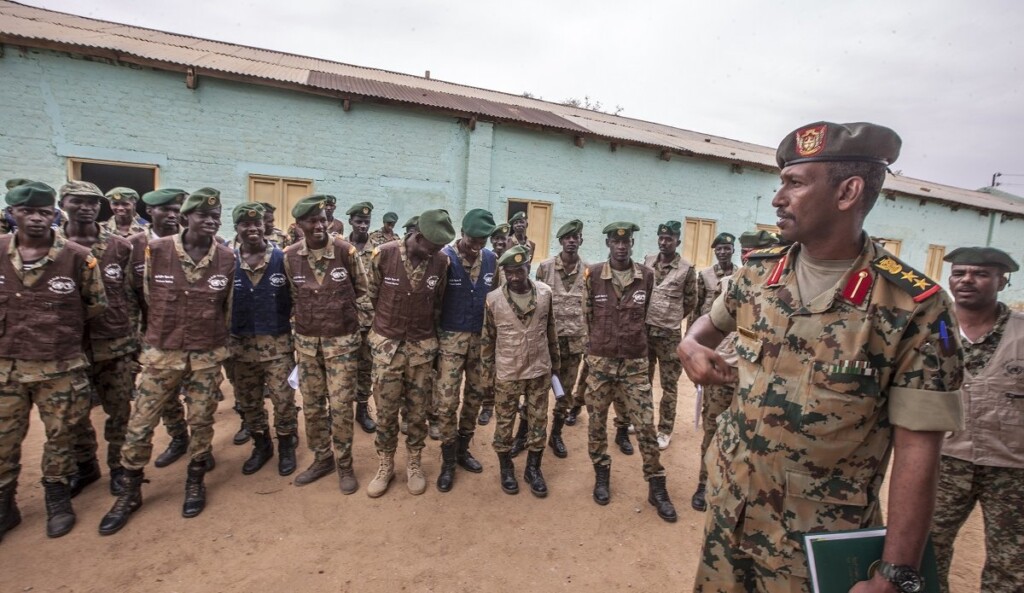Sudan politics: ‘Imminent agreement’ between FFC-CC and military
There has been news of an agreement between the Forces for Freedom and Change-Central Council (FFC-CC) and the military component of the government that provides for a civilian prime minister and a ‘government of competencies’. Control over the proposed Security and Defence Council remains a point of contention.
 Sudan Armed Forces (SAF) receive training on children's rights from UNAMID in 2017 (File Photo: Amin Ismail / UNAMID)
Sudan Armed Forces (SAF) receive training on children's rights from UNAMID in 2017 (File Photo: Amin Ismail / UNAMID)
There has been news of an agreement between the Forces for Freedom and Change-Central Council (FFC-CC) and the military component of the government that provides for a civilian prime minister and a 'government of competencies'. Control over the proposed Security and Defence Council remains a point of contention.
Both civilian and military sources confirmed to El Sharg news channel on Wednesday that the Chairman of Sudan's Sovereignty Council, Abdelfattah El Burhan, reached agreements with the FFC on many issues, but discussion is still ongoing with regard to some controversial points.
An 'imminent agreement' document was issued after extensive meetings between the two parties in Khartoum.
The 'imminent agreement' between the military and the FFC in Sudan stipulates the formation of a 'government of competencies' with a civilian prime minister, provided that the civilian components choose the prime minister and ministers.
It also stipulates the formation of a Security and Defence Council affiliated with the prime minister, but with El Burhan remaining the Commander-in-Chief of the Sudan Armed Forces (SAF) and Deputy-Chairman of the Sovereignty Council Mohamed Hamdan 'Hemeti' Dagalo remaining Commander of the Rapid Support Forces (RSF).
Controversial points in the ongoing negotiations relate to the representation of the military in the Security and Defense Council, as one group believes that the institution should be represented by the Commander-in-Chief of the Army rather than the prime minister.
FFC and the military
The mainstream Forces for Freedom and Change have received criticism from other opposition groups because of their sympathy towards a power-sharing government with the military.
Activists further criticised the FFC in their dealing with the resistance committees concerning failed plans to establish a Legislative Council in late 2020, in particular with regard to representation quotas for the resistance committees.
In response, the FFC has felt the need to repeatedly stress that it stands with the democratic transition and the overthrow of the coup and will not accept any initiative that keeps the putschists in power. It is unclear how activists will react to this 'imminent agreement'.
The FFC itself split up into the mainstream FFC-Central Council and the Forces for Freedom and Change-National Accord (FFC-NA), better known as the National Accord Forces (NAF). This split-off group is dominated by rebel groups that signed the Juba Peace Agreement and support the coup d’état of October 25 last year and has always been keen on including the military in any agreements.
The NAF recently collaborated with the Sudan People’s Call initiative, who have called for the army to assume political power in Sudan. The Democratic Unionist Party (DUP) is an ally of the NAF.
A workshop by the Sudanese Bar Association (SBA) envisioning a new transitional constitutional framework, which saw widespread participation from the FFC-CC and DUP, on August 10 concluded with a set of recommendations, including distancing the military from politics.
The workshop, however, was attacked by lawyers affiliated with the Al Bashir regime and associates of various other right-wing political groups.











 and then
and then